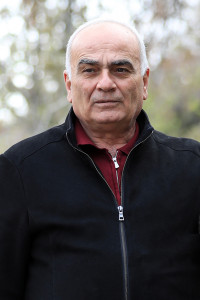40 YEARS IN THE SAME HOSPITAL …
 Interview with Samvel Grigoryan, Head of the Endoscopic Cabinet of the Ministry of Defense’s Central Clinical Military Hospital.
Interview with Samvel Grigoryan, Head of the Endoscopic Cabinet of the Ministry of Defense’s Central Clinical Military Hospital.
“Mr. Grigoryan, The same road has been brining you to this building for 40 years, which is now the Central Clinical Military Hospital, formerly known as the Railway Hospital. Were there doctors in your family or relatives? How did you and your profession find each other?
“My father worked at the Victory Park, my mother worked at the relays factory. We were six children, three brothers, three sisters. I was the youngest. No one has influenced my emotional world, my thinking, my moral perceptions like more thatn my mother. She taught human virtues easily and confidently. And all of her advice was about how to do good for the next person. Only after I became much older, did I realize that my mother had laid the foundation for my path to medicine.
After graduating from high school, I applied to the Faculty of History. But after the exams, I got sick. One day my father said, “You should become a doctor.” I was surprised because when a someon would die on our street, I was taken to my aunt’s house so that I would not be afraid. “You can’t accept it, that’s why you make up excuses,” my father said. I was offended. And to prove the opposite, I went to the medical institute.
“And when did you start to love your profession?”
“When I first got in touch with patients. While studying, I worked at the Mikaelian Institute’s Dialysis Unit as a nurse, preparing patients and dialysis equipment for operation. Our patients were people sentenced to death; they could live for a maximum of three years. At that time, no kidney transplantion surgeries were performed. And from these contacts a unique bond was born that only exists between a doctor and the patient – compassion, responsibility, commitment, dedication … After graduating from the medical institute, I went to work at this hospital, which was then called the Railway Hospital, and I am here to this day.”
“When the hospital was transferred to the Ministry of Defense, you were the chief doctor, right?”
“Yes, but before talking about the army, I want to tell you about the earthquake. I was the Deputy Chief Medical Officer, and that day both the Chief Medical Officer and the Deputy Medical Officer were ill. Within hours, the hospital was filled with injured people. I didn’t go to bed for more than a week and didn’t go home from the hospital. The same is true for our doctors. They sacrificed their lives for the wounded, sacrificing hundreds of lives by night.
When the hospital was transferred to the Ministry of Defense, it was soon filled with wounded officers and soldiers. The conflict on the borders continued, and there was always a flow of the wounded.”
“What is the formula for the happiness of a physician who has worked in the same hospital for 40 years?”
“I am happy that a new generation of doctors is coming to the hospital, full of devotion, dedicated … Once I knew all the doctors by name, I was familiar with their biographies. The hospital was my family. I don’t know many people now, and it is with a great sadness that we, my generation bore the difficulties of war time with dignity.”
By Gayane Poghosyan
Category: #11 (1331) 18.03.2020 - 24.03.2020, Destinies, Spotlight










